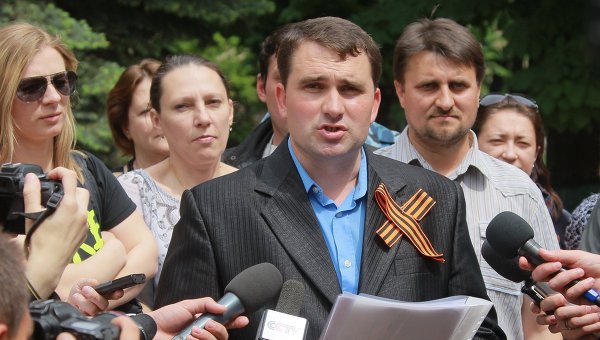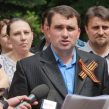
The Referendums in Ukraine’s Donbas: Aftermath and Consequences
Publication: Eurasia Daily Monitor Volume: 11 Issue: 90
By:

On May 11, self-declared “people’s councils” purported to hold “referendums” in approximately 20 or 25 towns or parts thereof, held by armed rebels in Ukraine’s Donetsk and Luhansk provinces (Donbas) (see EDM, May 9). The organizers claimed high turnouts and an overwhelming affirmative answer to the sole question on the ballot, identically phrased in both provinces: “Do you support the act of independence [samostoyatelnost] of the Donetsk people’s republic / Luhansk people’s republic?”
Outside the rebel-held towns, no political authority acknowledges the “referendums’” legal standing, let alone the purported results. Russia’s state television channels had strongly propagated these “referendums”; but the Russian government, out of diplomatic considerations, has stopped short of recognizing the results claimed by its own protégés in Donbas (see below).
The rebels allowed international media to cover the voting in hopes of gaining publicity. At this early stage, even unfavorable international publicity is more advantageous to the rebels than obscurity. They need to palpably demonstrate their local control and nuisance value, so as to pressure Kyiv (and strengthen Moscow’s hand to pressure Kyiv) into negotiations with the rebels.
According to Western and independent local media reports from the scene, basically anyone wishing to vote did so, often more than once, at improvised polling stations, without valid voter registers (these are stored at the Central Electoral Commission in Kyiv), and in the absence of accredited international observers. The rebels themselves counted the votes unchecked, the purported voter quorum and numbers of “yes” votes being unverifiable. Ukraine’s legislation does not allow holding local referendums, hence these attempts in parts of the Donbas region lacked a legal basis from the outset.
The Russian government has reacted with diplomatic ambiguity to these “referendums.” President Vladimir Putin’s spokesman, Dmitry Peskov, and Foreign Affairs Minister Sergei Lavrov both declared, somewhat abstractly, that “the will expressed by the people deserves to be respected” (Interfax, May 12).
Moscow will undoubtedly exploit these “referendums,” depending on how Moscow itself and its proxies on the ground choose to interpret the results. At this point, several possible interpretations are being considered.
The term on the ballot, “samostoyatelnost,” implies less than full independence (nezavisimost). It is consistent with a concept of sovereignty whereby most local laws would take precedence over the legislation of a federalized or confederalized Ukrainian state. However, samostoyatelnost can also be interpreted as a basis for declaring outright secession from Ukraine.
The “people’s councils” are debating follow-up steps in the “referendums’” aftermath. These debates reflect internal factional differences as well as chaotic local circumstances (Interfax-Ukraine, UNIAN, Ukrainian Channel Five TV, Podrobnosti, May 12, 13).
On May 12 and 13, the interim leader of the Donetsk “people’s council,” Denis Pushilin, made two mutually conflicting statements on the council’s behalf. In the first, he called for merging the Donetsk and Luhansk provinces into a single entity, as part of a federalized or a confederalized Ukraine. In the second statement, he called for conducting a further referendum on the question of joining the Russian Federation (Interfax-Ukraine, UNIAN, Ukrainian Channel Five TV, Podrobnosti, May 12, 13).
Apart from cancelling each other out, both statements contradicted the “referendums’” ostensible results. Those results purported to lay the basis for two distinct entities, Donetsk and Luhansk; and they do not in any way imply accession to Russia.
Another viewpoint in the Luhansk “people’s council” favors holding a referendum jointly with other provinces of Ukraine’s east and south, first and foremost Kharkiv, with a view to merging into a “Novorossiya” (“New Russia”) or “South-East” entity. The latter would then supposedly enter into some kind of federal or confederal arrangement with the rest of Ukraine. Activists of the Moscow-sponsored movement “South-East [of Ukraine],” headed by Oleg Tsaryov (Verkhovna Rada parliamentary deputy, fugitive from Kyiv), had suggested a postponement of the Donetsk and Luhansk “referendums,” so as to synchronize them with a Kharkiv referendum. Such initiatives, however, have failed to catch on in Kharkiv and elsewhere thus far (Interfax-Ukraine, UNIAN, Ukrainian Channel Five TV, Podrobnosti, May 12, 13).
Russian intelligence operative Igor Strelkov/Girkin, headquarted in the eastern Ukrainian city of Slovyansk, has been appointed commander in chief of pro-Russia forces in the Donestk province, ostensibly on behalf of the “people’s council.” The latter, based on the “referendum,” demands that Ukrainian security forces withdraw from the province entirely, failing which they would be deemed “occupation forces” (UNIAN, May 12). Strelkov/Girkin is known to have communicated directly with military superiors in Moscow and with the Kremlin, by direct line to Slovyansk (see EDM, May 6).
The “people’s councils” in Donetsk and Luhansk can be expected to demonstrate maximum tactical flexibility in the “referendums’” aftermath. They take the position that the broad “mandate” they have supposedly received is more important than any specific way of implementing such a mandate. Nor will they rush to implementation in one way or another. They and Moscow will, instead, take their time and use these “mandates” for bargaining leverage against the Ukrainian government.
Federalization, confederalization, merger into a South-Eastern Ukraine or a Novorossiya entity, secession, accession to the Russian Federation—all these options will be presented as potential consequences of the “referendums” just held, or as justifying fresh ones to supersede those just held.
This manner of playing fast and loose reflects the overall atmosphere of lawlessness in which these unelected, self-appointed “people’s councils” operate. But more importantly, it amounts to a Damoclean sword that Moscow now holds over Ukraine. It threatens to disrupt Ukraine’s May 25 presidential election and—irrespective of its result—to blackmail the post-election government during the process of adopting Ukraine’s new constitution. The threat to tear the Donbas away is a means of pressuring Ukraine into a “federal” settlement on Russia’s terms.




